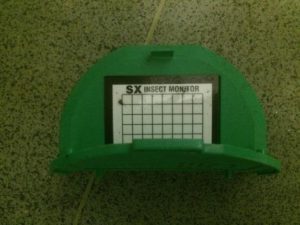

By Peter Fudge, RSPH-qualified pest control technician for Olli Group, in East London.
In this article, I will explain how to eradicate a cockroach infestation in a busy kitchen of a commercial canteen. We will use the example of a shopping centre staff restaurant we treated in 2017. I will show you what a professional pest control operative does to quickly get your problem under control - without losing use of your facilities. We'll look at the different strategies available to wipe out cockroaches, and how to make sure they don't come back.

Before we get onto the actual techniques we use to eradicate cockroaches, it's very important to look at how you stop them coming back. Cockroaches come into your premises because they want food, water and shelter. They can feed on grease build-up and food spills behind fridges, ovens, and skirting boards. They are attracted to any water source and can drink water from leaky pipes, sinks, wet dishcloths and - horrifyingly - even from your tooth brushes. And they hide in cracks in the walls, floors, skirting boards, behind fridges and appliances. Once, we even saw roaches nesting inside a computer case! Anywhere dark with a small entry point can become a home to these unwelcome guests.
As part of our PPM (Planned Preventative Maintenance) contracts we will identify water leaks and places pest can enter and hide. We'll also let you know exactly what you need to do in terms of on-going cleaning and other preventative measures.
[su_box title="Case study - part 1" style="soft" class="icon-briefcase services"]In our case study, the cockroaches were first identified by an Environmental Health inspection in the staff canteen of a shopping centre. In fact, we had previously attended this premises a few years earlier to treat an infestation of rather stubborn black ants. At that time, we explained to the staff in canteen that their housekeeping needed to improve, in order help us eradicate the ants. This was taken on board, and we noticed a marked improvement in our follow-up visits. However, when arrived to investigate the cockroach infestation on the evening of the 26th of April, we were sad to see that standards had lapsed again and there was much grease and fat on the lino floor, rubberised skirting and the cupboard surfaces. So it's clear that lack of proper cleaning had enabled the cockroaches to take hold. Since this most recent incident, the client has contracted us to do PPM - visiting 5x per year to monitor for pests and make sure there are measures in place to stop another infestation occurring. continues in box below[/su_box]
When we arrive at a premises, we need to know what sort of insect is causing the problem. If we are unable to see them by inspecting likely nest sites with a torch, we put down baited glue trap monitors which will catch and kill some of the insects. We are then able to identify which species is involved, how many there are likely to be, and so choose an appropriate treatment.
We need to know where the critters are getting in and out, both from any hiding places and the whole retail unit. We will block these entrances and exits where possible as part of the prevention strategy.
We work in partnership with Edialux pest control suppliers. Edialux are a local firm who carry a good stock and always have the latest products as soon as they come on to the market. Pests can become resistant to treatments and so it is important to stay on top of the latest effective control products and Edialux help us to do that.
Knockdown sprays are one of the most effective tools we have in the fight against cockroaches. It's a great way to treat a large area and it's probably the quickest way to reduce cockroach numbers. However in food preparation areas a knockdown spray is usually out of the question. The spray must not get onto food preparation surfaces and mopping would remove the insecticide. Everything that is food preparation related would need to be boxed and sealed, with particular care needed to target just the floor and skirting.
Knockdown spray also requires (dependant on product) premises evacuation of between 4 and 8 hours, to allow for residual settling of the insecticide after spraying. This is so that it won't be inhaled, and sensitive people like asthmatics can be particularly affected.
Fortunately, there are other options in the modern day pest controller’s armoury.
The treatment we elected to use was Goliath Gel. It is made by the chemical giant BASF's pest control division and comes in tiny, but rather expensive 35 gram gel cartridges. Each tube can give 1000 bait placements, so despite the small size and big price tag, it can still be a very cost effective treatment. The gel has been proven to be extremely effective against German and most other species of cockroach, and is much less intrusive than spraying.
The active ingredient in Goliath Gel is Fiprinol, which acts as an insect nerve agent. It induces a kind of chemical rush into all stages the cockroach and produces a similar effect to a massive cocaine or heroin overdose in humans, sending the insect’s nerve system into overdrive. The gel also contains pheromones, attracting the roaches to wherever it’s been deposited and very little is needed to produce a ‘cascade’ effect throughout the colony. The poison can be passed between live insects as well as being consumed by live roaches eating dead ones, which all species of cockroach are given to doing.
Goliath gel is very highly regarded and every pest controller we know thinks of it as just about the best solution - especially around food. It is so highly palatable to cockroaches, we've even had them try to eat it directly from the nozzle while applying it - they love it!
Goliath Gel is applied in spots, away from food, but in places the cockroaches are likely to visit:
After laying the gel bait, we need to check how well it is working. Glue trap monitors are placed in areas of heavy cockroach traffic. When these return clear, we know that the infestation is over. As part of a PPM we would lay monitors and return between 5 and 10 times per year as well as identifying cracks and gaps where pests might get in, where they might hide, and offering the client advice on cleaning.
[su_box title="Case study - part 2" style="soft" class="icon-briefcase services"]

Cockroach trap at the start of the treatment period, shows many dead cockroaches.

Insect monitor at the end of the treatment period. It is clear of pests.
Within 31 days the infestation in the shopping centre staff cafeteria is completely eradicated. Trade was not affected and the canteen was able to remain open.
The client said:
"We were very happy that Olli Group managed to eradicate the problem so swiftly, and their service was cost-effective compared to other firms we have used. We are inviting Olli to provide preventative solutions for our other retail properties across the South East"
By employing Olli Groups as a PPM contractor going forward, they are showing Environmental Health that they are a bona fide trader and taking their responsibilities seriously. While you cannot prevent a single cockroach getting into your premises, if you can show you have a program of preventative eradication in place you are more likely to pass these tests. That's why we offer ongoing prevention and monitoring as well as reactive call-outs. [/su_box]